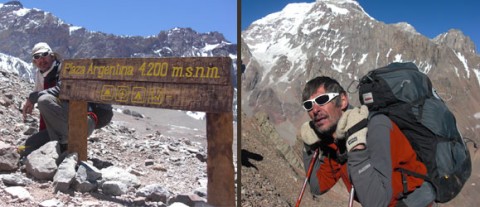Edmond Rivère, a professor of French at UBC Okanagan, recently returned from a 13-man mountaineering expedition to the highest mountain in the Americas, Cerro Aconcagua (6,962m or 23,000 feet), to raise funds for researchers working to defeat prostate cancer and to raise public awareness of the importance of early detection and treatment of the disease.
“Personally, I’ve done a lot of mountaineering, but this was my first high-altitude expedition,” says Rivère, who is also an avid rock climber and paraglider. “I’ve wanted to climb Aconcagua for a while, so when I heard about my colleagues’ plan to raise money for prostate cancer research and awareness, I thought, ‘sure — let’s do it’.”
Rivère was one of five people from the Okanagan Valley to make the trip. Collectively, the expedition raised about $200,000 for the UBC Hospital Foundation and the Prostate Centre at Vancouver General Hospital.
“The group from the Okanagan paraglides together, so the deal was to go to the summit and fly all the way down to Punta del Inca, a 40-kilometre glide,” says Rivère.
Paragliding from the summit has been done before, but Aconcagua is one of the windiest mountains on the planet. “Of 18 days on the mountain, we only had one day without wind, which blew at an average of about 60 to 80 kilometres per hour, night and day. To fly the summit you need only one thing: light winds on the summit and hardly any wind in the valley. We had a forecaster checking winds every day on Aconcagua at different elevations.”
Although not the most technically difficult climb for mountaineers, Aconcagua does present its own challenges. The base camp is at an elevation of 4,200 meters, meaning mountaineers must acclimatize themselves to avoid health risks such as pulmonary or cerebral edema, which is fluid in the lungs or brain caused by high elevations and can result in death.
“It takes three days of walking to get to Base Camp from the village of Punta del Inca — about 60 kilometres — and we had mules to carry the equipment and food, which weighed about 60 to 80 kilograms per person,” says Rivère. “Then once we reached Base Camp, we had rest days, hiking days and flying days. We actually had a good flight on the second rest day.”
After days of carrying equipment from base to Camp One and then Camp Two (at about 6,000 m), the expedition was facing a time crunch, so the men decided to head from Camp Two straight to the summit, instead of moving to Camp Three. Six of the 12 men reached the summit — a good success rate for any expedition.
“I wasn’t one of them, though, because I wanted to climb and paraglide,” says Rivère. “We had an emotional and exciting moment at Camp Two, because we got a call from our forecaster Jerry Mason who said that there would be a flying window between midnight and mid-day the next day. That evening we packed our wings and climbing gear preparing for the final assault towards the summit hoping to fly from the top the next day.”
However, that night a number of the paragliding team members experienced mild stomach problems and headaches from the high altitude.
“It was really hard to swallow, but at 4 a.m., we decided not to go,” says Rivère. “I think we did the right thing — we didn’t feel 100 per cent, and it’s a 16-hour climb from Camp Two to the summit, so if anything happens, there are no rescue possibilities.”
Although Rivère didn’t get to fly the summit, he said it was a great adventure and a very successful way of raising awareness and funds for an important cause. The Aconcagua Climb for Prostate Cancer Research team was composed of individuals in their late 40s and older, all with a passion for adventure and physical challenge. Anyone who would like to donate to, or learn more about, the expedition can still do so by visiting http://www.climbforprostate.com/.
— 30 —
